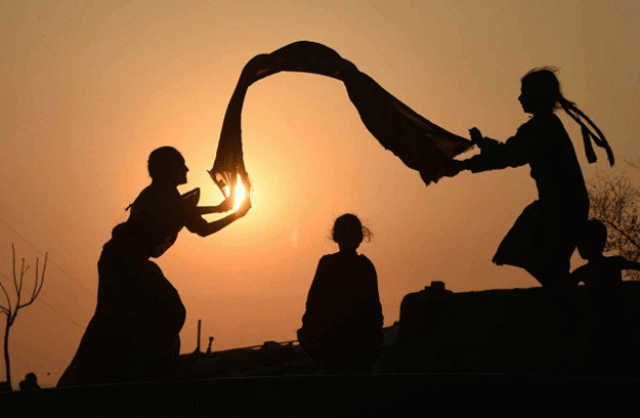The CII: overstepping its advisory role
Parliamentary committee rejected the Child Marriage Restraint (Amendment) Bill 2014 after CII dubbed it “anti-Islamic”

It is time our parliamentarians started making laws that reflect the country’s realities instead of being browbeaten by the pronouncements of a body that is only supposed to have an advisory role.
PHOTO: AFP
Earlier in the week, there was a debate in the Senate in which lawmakers suggested that the body should be abolished since it completed its constitutional task back in 1996. Going by the mood of the nation, this is not going to happen any time soon. But going by the CII’s performance, it is only logical not to rule out the possibility of a creeping backlash against its exaggerated self-image. The CII’s pronouncements started receiving royal treatment ever since the advent of General Zia’s regime.
It will be educational to remind readers of its various pronouncements over the years. Regarding punishing the misuse of blasphemy laws, the CII has said that there are laws in the Pakistan Penal Code, which deal with registration of false cases and false statements, and these can be applied to blasphemy cases as well. Regarding using DNA test reports as proof to verify rape, it has insisted adherence to the current law that requires four mature individuals to testify the occurrence of this crime, while DNA reports can only be used as supplementary proof. Regarding the existing law that requires a “written approval” from the first wife if a man wants to marry a second time, the council is of the view that this law is against Islamic principles and therefore should be abolished. It also ruled that a woman older than 40 can serve as a judge, provided she is properly veiled.
And now, the National Assembly’s Standing Committee on Religious Affairs and Interfaith Harmony has rejected the Child Marriage Restraint (Amendment) Bill 2014 after the CII dubbed it “anti-Islamic” and “blasphemous”. Sindh now has a law that declares marriage before the age of 18 a violation of the rights of children, and carries fines and imprisonment. The Punjab Assembly has approved a bill amending the Child Marriage Restraint Act of 1929, holding not only parents of underage children, but also the cleric who allows such a marriage, liable on criminal charges, including fines and imprisonment. It is crucial that the laws enacted be enforced. But cultural taboos carrying religious respectability and rampant poverty in the country have made it very difficult for these laws to be implemented.
Child marriage is closely associated with schooling for girls as poverty leads many families to withdraw their daughters from school and marry them at young ages. These girls are denied the benefits of education, which include improved health, balanced fertility and increased economic productivity. Seven per cent of Pakistani girls are married off under the age of 15, according to Unicef’s State of the World’s Children Report 2014. Statistics from as recent as 2014 indicate that one in three girls in Pakistan is married before her eighteenth birthday. There are several reasons behind these appalling statistics. They range from extremely weak legislation, lack of implementation of the laws that do exist, an absence of public awareness of the harmful effects of early marriage, poverty and a common perception that girls are liabilities. On top of all this, the attitude of the CII has clearly added to problems. It is time our parliamentarians started making laws that reflect the country’s realities instead of being browbeaten by the pronouncements of a body that is only supposed to have an advisory role.
Published in The Express Tribune, January 17th, 2016.
Like Opinion & Editorial on Facebook, follow @ETOpEd on Twitter to receive all updates on all our daily pieces.















COMMENTS
Comments are moderated and generally will be posted if they are on-topic and not abusive.
For more information, please see our Comments FAQ